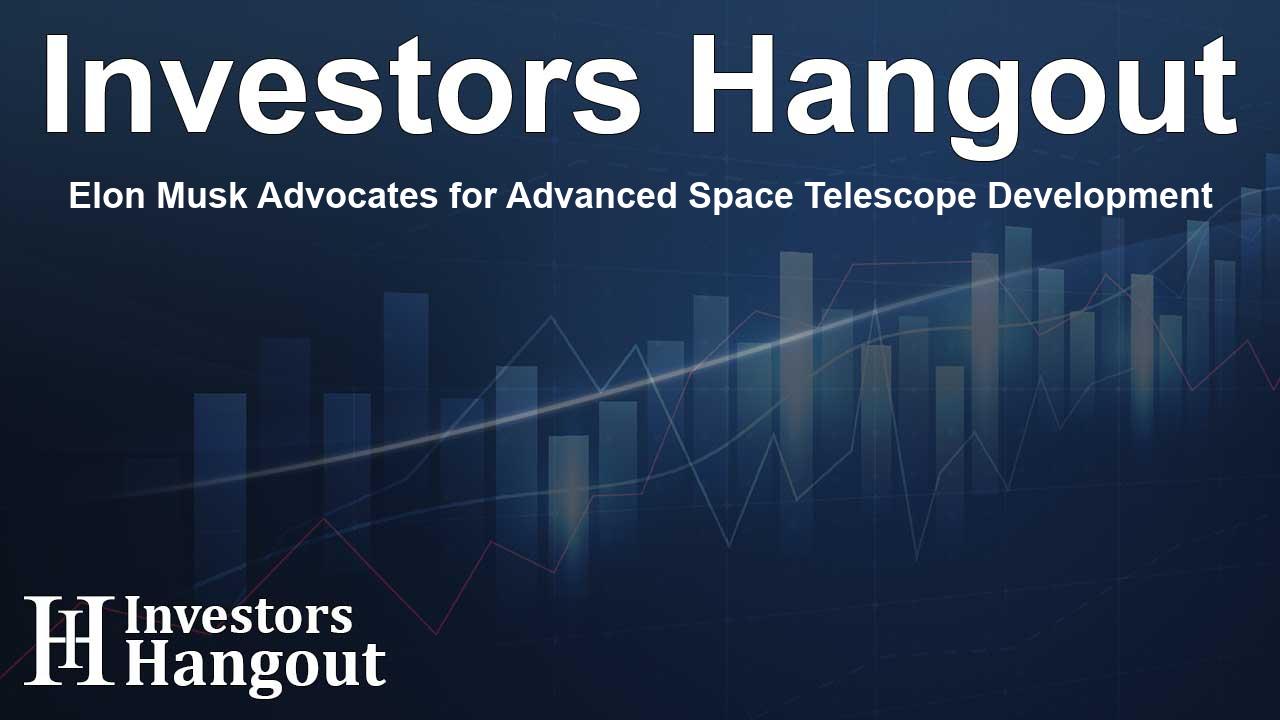Elon Musk Advocates for Advanced Space Telescope Development

Elon Musk's Vision for a Next-Generation Telescope
SpaceX CEO Elon Musk has recently expressed his thoughts on the necessity for a new visible spectrum space telescope that would surpass the capabilities of the Hubble Space Telescope. In a statement shared on the social media platform X, Musk noted, “Hubble is cool, but there needs to be a new visible spectrum space telescope with far larger aperture.” This remark highlights Musk's forward-thinking perspective on astronomical advancements.
The Legacy of Hubble
The Hubble Space Telescope has had a remarkable journey since its launch into low-Earth orbit in 1990. For over three decades, it has provided us with stunning imagery and invaluable data about our universe while orbiting at an altitude of approximately 340 miles. Despite its long-standing service, Hubble has received multiple upgrades, the latest occurring in 2009. Experts believe it will continue to function until around 2030-2040, yet there's an increasing conversation about its potential replacement.
Benefits of a New Telescope
Elon Musk’s advocacy for a new telescope stems from the expectations of enhanced capabilities that a larger aperture would provide. A telescope with greater light-gathering power can observe fainter stars and galaxies, allowing for deeper exploration of the cosmos. This would significantly augment our understanding of not only distant objects but also fundamental cosmic phenomena.
The Polaris Program and Hubble's Future
Another noteworthy initiative in this context is the Polaris spaceflight program, spearheaded by Jared Isaacman, CEO of Shift4 Payments. Isaacman has proposed servicing the Hubble Telescope as part of this ambitious human spaceflight program. Currently envisioned to encompass up to three human spaceflight missions with SpaceX, the Polaris program aims to merge commercial spaceflight with significant scientific contributions.
Seeking NASA's Approval
Despite the enthusiasm surrounding the Polaris program, NASA has yet to approve the proposed servicing mission for Hubble. Reports suggest that NASA is deliberating on the feasibility of utilizing SpaceX hardware for potential servicing missions to the telescope. The success of Polaris Dawn, the first mission under the Polaris program, which recently achieved remarkable altitudes and conducted a groundbreaking commercial spacewalk, may bolster the case for servicing Hubble in the future.
The Future of Space Exploration
The successful accomplishments of the Polaris Dawn mission provide reassurance regarding SpaceX's capabilities in realigning NASA's confidence about servicing Hubble. The exciting developments during the Polaris missions not only influence NASA's decision-making but also reinforce the role of private companies in the advancement of space exploration.
Conclusion: A New Era for Space Telescopes
Musk's initiative to push for a state-of-the-art space telescope could signify a new chapter in astronomical research, where advanced technology better equips scientists to explore the universe. As discussions progress, the collaborative efforts between commercial space endeavors and governmental space agencies may pave the way for breakthroughs in our quest to understand the cosmos.
Frequently Asked Questions
What did Elon Musk say about the Hubble Telescope?
Elon Musk indicated that there is a need for a new space telescope with a larger aperture than Hubble to enhance astronomical observations.
Why is Hubble still significant?
The Hubble Space Telescope has provided over three decades of valuable astronomical data and imagery, continually aiding scientific discovery.
What is the Polaris program?
The Polaris program, led by Jared Isaacman, aims to conduct human spaceflight missions with SpaceX and includes proposals to service the Hubble Telescope.
How did Polaris Dawn contribute to the discussion about Hubble?
Polaris Dawn's successful mission demonstrated the capability of SpaceX hardware, which may play a crucial role in future servicing of the Hubble Telescope.
What are the potential benefits of a new telescope?
A new telescope with a larger aperture could gather more light, enabling the observation of fainter celestial objects and enhancing our understanding of the universe.
About The Author
Contact Henry Turner privately here. Or send an email with ATTN: Henry Turner as the subject to contact@investorshangout.com.
About Investors Hangout
Investors Hangout is a leading online stock forum for financial discussion and learning, offering a wide range of free tools and resources. It draws in traders of all levels, who exchange market knowledge, investigate trading tactics, and keep an eye on industry developments in real time. Featuring financial articles, stock message boards, quotes, charts, company profiles, and live news updates. Through cooperative learning and a wealth of informational resources, it helps users from novices creating their first portfolios to experts honing their techniques. Join Investors Hangout today: https://investorshangout.com/
The content of this article is based on factual, publicly available information and does not represent legal, financial, or investment advice. Investors Hangout does not offer financial advice, and the author is not a licensed financial advisor. Consult a qualified advisor before making any financial or investment decisions based on this article. This article should not be considered advice to purchase, sell, or hold any securities or other investments. If any of the material provided here is inaccurate, please contact us for corrections.
